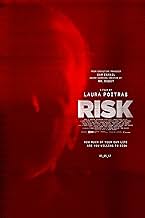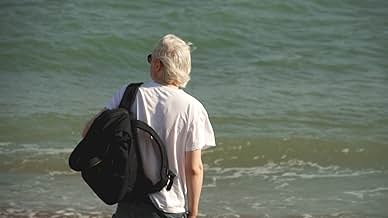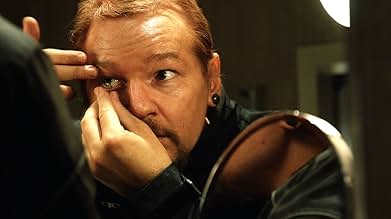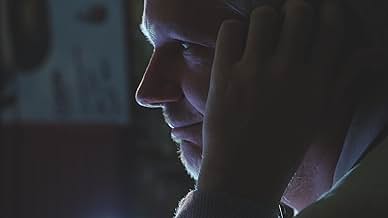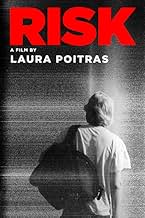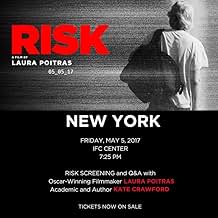IMDb-BEWERTUNG
6,3/10
2383
IHRE BEWERTUNG
Die Geschichte von WikiLeaks-Chefredakteur Julian Assange, erzählt von der Dokumentarfilmerin Laura Poitras.Die Geschichte von WikiLeaks-Chefredakteur Julian Assange, erzählt von der Dokumentarfilmerin Laura Poitras.Die Geschichte von WikiLeaks-Chefredakteur Julian Assange, erzählt von der Dokumentarfilmerin Laura Poitras.
- Auszeichnungen
- 4 Nominierungen insgesamt
Laura Poitras
- Self
- (Synchronisation)
Louis Bladel
- Self - FBI counterintelligence
- (as Special Agent Louis Bladel)
Hillary Clinton
- Self
- (Archivfilmmaterial)
James Comey
- Self
- (Archivfilmmaterial)
Anderson Cooper
- Self
- (Archivtonaufnahmen)
Handlung
WUSSTEST DU SCHON:
- WissenswertesThe WikiLeaks lawyers Margaret Ratner Kunstler, Deborah Hrbek, Renata Avila and Melinda Taylor published an 'opinion piece' in Newsweek on May 17, 2017; WikiLeaks announced on the same day on Twitter that they may sue Laura Poitras: "We are lawyers for WikiLeaks. We are speaking out because we believe that Laura Poitras's film Risk (2016), released in U.S. theaters on May 5 this year, places our clients in legal jeopardy. (...) Our first issue with "Risk" is that the film was edited in New York, where the raw footage can more easily be seized by the U.S. government. By moving the editing location from Berlin to the U.S., Poitras has endangered our clients and reneged on written agreements with WikiLeaks that explicitly forbid her from editing the footage in the United States. (...) Poitras has also violated her unambiguous promise to the subjects of the film that they would have an opportunity to review the film in advance and request changes, and that they could decline to appear if they or their lawyers felt that the movie put them at risk. Had the filmmaker not agreed to these express conditions, WikiLeaks' staff would not have allowed themselves to be filmed in the first place. Despite repeated requests, neither the subjects of the film nor their attorneys were granted a prior viewing of the film that Poitras intended to release in the U.S.. When, along with the general public, we were finally able to view "Risk", we were dismayed to discover that the film released in theaters is a different version, not only from that which premiered at Cannes the year before, but also from the version screened for Julian Assange and his UK counsel at the Ecuadorian Embassy in London. The film viewed in the Embassy just one month prior to its U.S. release was shorn of all narration and omitted numerous new scenes, significantly changing its tenor. That the 'real' film contained these elements was concealed, preventing Assange from exercising his contractual rights. Prior to its initial U.S. release, seven of the participants submitted non-consent forms to the producers advising Poitras and her team that they did not want to appear in the film. Regardless, Poitras went ahead and released it. (...) To convince the audience of her point about the prevalence of sexism, Poitras has marginalized and demeaned a number of women who work for WikiLeaks, choosing instead to give men most of the airtime and leaving scenes depicting the significant contributions of the women WikiLeaks journalists on the cutting room floor. In their place, we now see an intense focus on women taking instructions and throwing off adoring looks. Sarah Harrison, for example, a brilliant journalist and winner of the Willy Brandt prize for "exceptional political courage," who at considerable personal risk helped Edward Snowden obtain political asylum, and who was accurately portrayed as having a central role in WikiLeaks work in the Cannes version, is now depicted as little more than a minion. Exactly what caused this pivot is not entirely clear. (...) The reason for the shift seems to be contained in the newly added voiceover, in which Poitras divulges that she was involved in an intimate relationship with one of the film's primary subjects, award-winning journalist Jacob Appelbaum. Appelbaum appears prominently in Poitras' Citizenfour (2014) as well as in "Risk". Although he does not work for WikiLeaks, Poitras conflates WikiLeaks with the organization he did work for, Tor, and makes him a central focus of the current version of "Risk". The Cannes premiere of "Risk" portrayed Appelbaum in a flattering light and Poitras did not disclose the nature of their relationship at that time. (...) Poitras was criticized after Cannes for appearing to be overly sympathetic to WikiLeaks. Instead of providing us with a more objective portrayal of her subject matter, she has re-framed her story to turn "Risk" into a film by Laura Poitras about Laura Poitras; a rather late coming-of-age story about the filmmaker discovering that there is sexism in her social and professional circles. Instead of a documentary about the abuse of state power and WikiLeaks' important role in exposing it, the emphasis of the film is now to highlight hotly disputed claims about an ex-boyfriend. We have to ask: Why choose this moment in history, when First Amendment and other fundamental rights are under attack, to undermine the credibility of an organization dedicated to government transparency and freedom of the press? (...) "Risk" might win attention for Poitras by pandering to tabloid narratives about its subjects, but it has done a great disservice to her fellow documentarians, and has profoundly betrayed her friends, her colleagues and her journalistic integrity."
- Zitate
Julian Assange: We don't have a problem, you have a problem.
- VerbindungenFeatures Collateral Murder (2010)
Ausgewählte Rezension
Preferring to find a movie on what the theme is and liking more imported foreign films and documentaries than those made in prolific USA, here the main person and the well-known 'Wikileaks' was an instant click, so had to go and see & learn more than mass media informs us about Julian Assange. And this writer was totally fascinated and involved throughout entire film.
While Poitras' personal inserted comments came in - but voiced more quietly,volume down- we had to attended more to hear and absorb these inserts. We needed to hear these added, helpful information bits to the scenes portrayed.
Assange was mostly seen in close-ups, so his every impartially-held facial expression could still not be easily read. But some good glimpses of his attitude were revealed anyhow. He hid some when filmed, even while talking lots, and he sometimes droned on ....so when his words were mumbled / hummed Assange was heard less. So while he was carefully conveying some info in his not-subtle ways, at times he left this writer confused, as when he refused to give direct answers to clear questions asked in film.
His female associates were not identified if in what kind of 'relationship' to Julian, or what their expertise was.... other than being always there, supportive, helping him groom or make escapes. That women were always in the " rescuer" roles left the impression that they may be & still are attracted to Julian as "hero", and thus to do the usual 'woman's work' only. As only assistants ?
Their other values, whatever they are, were not clarified nor appreciated either. Julian's mother, also included in such roles, was seen as only-adjunct helper. Can this be so ?
But other scenes showed Julian more actually responding to his circumstances -which is mostly well known & displayed in ordinary TV news clips.
His complaints - while living well - and while limited to living in only 1 fancy embassy- bldg seemed petulant and childish, as he refused to admit responsibility to eliciting the 'unexpected unwanted consequences' to his work . His own actions affected many political people, who still want to censor and punish any 'whistle-blowers', including but not just Assange.
Wikileaks has emerged as a very influential media platform source and as a threat to those who prefer their secrets kept away from the many people the actions do affect, kill, and distort . Many lives may have been/ are still changed from their exposures, as noted even in the most recent / now current events.
To learn more about the main man, tho not the only 1, who still holds dominance on the organization is very relevant and important to us all = the viewers and citizens of these media-blitzed and news-censored worlds. Tho film was a bit long, but still held the viewers' full attention,no one walked out.
This is a must-see film to those who want to better understand the man who helps still now reveal" what is happening " behind many locked 'confidential' doors/ documents &emails. Those are, perhaps, more real than what is exposed as governments' workings elsewhere. " Risk" is not a risk but a must-also-see-this-film.... for anyone watching daily propagandized & commercialized & censored news anywhere.
While Poitras' personal inserted comments came in - but voiced more quietly,volume down- we had to attended more to hear and absorb these inserts. We needed to hear these added, helpful information bits to the scenes portrayed.
Assange was mostly seen in close-ups, so his every impartially-held facial expression could still not be easily read. But some good glimpses of his attitude were revealed anyhow. He hid some when filmed, even while talking lots, and he sometimes droned on ....so when his words were mumbled / hummed Assange was heard less. So while he was carefully conveying some info in his not-subtle ways, at times he left this writer confused, as when he refused to give direct answers to clear questions asked in film.
His female associates were not identified if in what kind of 'relationship' to Julian, or what their expertise was.... other than being always there, supportive, helping him groom or make escapes. That women were always in the " rescuer" roles left the impression that they may be & still are attracted to Julian as "hero", and thus to do the usual 'woman's work' only. As only assistants ?
Their other values, whatever they are, were not clarified nor appreciated either. Julian's mother, also included in such roles, was seen as only-adjunct helper. Can this be so ?
But other scenes showed Julian more actually responding to his circumstances -which is mostly well known & displayed in ordinary TV news clips.
His complaints - while living well - and while limited to living in only 1 fancy embassy- bldg seemed petulant and childish, as he refused to admit responsibility to eliciting the 'unexpected unwanted consequences' to his work . His own actions affected many political people, who still want to censor and punish any 'whistle-blowers', including but not just Assange.
Wikileaks has emerged as a very influential media platform source and as a threat to those who prefer their secrets kept away from the many people the actions do affect, kill, and distort . Many lives may have been/ are still changed from their exposures, as noted even in the most recent / now current events.
To learn more about the main man, tho not the only 1, who still holds dominance on the organization is very relevant and important to us all = the viewers and citizens of these media-blitzed and news-censored worlds. Tho film was a bit long, but still held the viewers' full attention,no one walked out.
This is a must-see film to those who want to better understand the man who helps still now reveal" what is happening " behind many locked 'confidential' doors/ documents &emails. Those are, perhaps, more real than what is exposed as governments' workings elsewhere. " Risk" is not a risk but a must-also-see-this-film.... for anyone watching daily propagandized & commercialized & censored news anywhere.
- relate-47835
- 14. Mai 2017
- Permalink
Top-Auswahl
Melde dich zum Bewerten an und greife auf die Watchlist für personalisierte Empfehlungen zu.
- How long is Risk?Powered by Alexa
Details
Box Office
- Bruttoertrag in den USA und Kanada
- 200.219 $
- Eröffnungswochenende in den USA und in Kanada
- 76.327 $
- 7. Mai 2017
- Weltweiter Bruttoertrag
- 214.669 $
Zu dieser Seite beitragen
Bearbeitung vorschlagen oder fehlenden Inhalt hinzufügen




